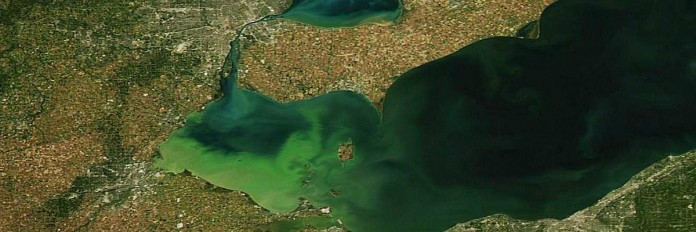(This is a developing story. Updates being made)
SALEM, Ohio — The Ohio EPA and Gov. John Kasich are declaring the open waters of Lake Erie’s Western Basin impaired for recreation, due to harmful algae and drinking water concerns related to the toxin microcystin.
The announcement came March 22, and is the first time such a designation has been made. According to the Ohio EPA, Kasich sought input from Ohio State University’s Sea Grant college program, Bowling Green State University, the University of Toledo, as well as the National Oceanic and Atmospheric Administration and U.S. EPA.
“We have taken unprecedented steps in recent years to put Lake Erie on a better trajectory – including investing more than $3 billion to improve its water quality,” said Ohio EPA Director Craig Butler, in a released statement. “Governor Kasich takes his responsibility to protect the lake very seriously. While designating the open waters of the Western Basin as impaired does not provide, as some suggest, a magic bullet to improve the lake, the state remains committed to our obligations under the Clean Water Act and to examine emerging science and practices that we can put in place to help improve it.”
What farmers are saying
Farm groups responded with mixed reactions, as some had hoped their voluntary efforts would ward off, and even supersede, the need for a federal designation.
The Ohio Corn & Wheat Growers Association, along with the Ohio Soybean Association, said they are “disappointed with the decision,” following years of progress and private spending to improve water quality.
“Despite the emotional and political appeal of an impairment designation, it will do nothing to trigger additional federal dollars,” the groups said in a released statement. “It could force us to retrace our steps to rediscover what we already know from years of diligent work on this issue and could delay real solutions for the lake.”
The crop associations say the state should follow the path of The Great Lakes Water Quality Agreement, an agreement made between the United States and Canada was updated in 2012 to address harmful algae blooms. That agreement was the basis of the target set four years later by Ohio, Michigan and Canada of a 40 percent reduction in total phosphorous entering Lake Erie by 2025.
What this means
The Ohio Farm Bureau says the designation will have no immediate impact on water quality, or on farmers.
“Our biggest worry is that the public may get the impression that this is the silver bullet that will eliminate harmful algal blooms. It won’t,” said Adam Sharp, the OFBF executive vice president.
It does not create mandatory actions, nor does it provide federal money. It excludes Canada’s role in protecting the lake. It also will create a long and complicated bureaucratic process that may impede current progress on reducing harmful algal blooms.
Farm Bureau’s analysis suggests the regulatory and legal process could take 5 to 7 years before actual nutrient reduction steps would be taken. Further, uncertainty over what actions might be required in the distant future may cause municipalities, farmers and others in the regulated community to question their current efforts to improve water quality.
“It’s hard to reach the goal line when no one can explain the rules or even tell you where the goal line is,” Sharp said.
Which way to go
Farm Bureau says it has never opposed the “declared” designation, but like the commodity groups, the OFBF has promoted the Great Lakes Water Quality Agreement as a preferable plan for improving water quality.
Likewise, Farm Bureau said it “remains unconvinced that the impairment designation was necessary,” but vowed to continue working on solutions that benefit farmers and Lake Erie.
Some of the past and ongoing efforts include new laws that regulate nutrient runoff from farm fields, along with voluntary steps by farmers, and millions of dollars that have been donated to research and identify better farming practices.
On March 20, Farm Bureau joined with the Ohio Certified Crop Advisors, Ohio Federation of Soil and Water Conservation Districts, Ohio State University Extension and eight other farm organizations, to provide farmers with formal nutrient management plans, that spell out specific steps to lessen nutrient runoff.











There is no mystery here – we went from small farms, fenced in small parcels, lots of pasture and hay and a variety of solid seeded crops to large farms, large fields few fences, few species in the rotation to row crops all in the span of 60 years. Soils were healthier and water couldn’t get to the lake without going through a lot of filters.
We maybe can not go all the way back but opportunities exist for positive environmental benefits going hand in hand with positive economic benefits.
We can solid seed and inter-seed corn, solid seed soybeans plant cover crop before or after bean harvest and double crop wheat with soybeans, buckwheat and forages. Wheat maybe doesn’t look attractive by itself but add a second crop and factor in soil health benefits and suddenly it becomes the best paying commercial grains crop.
The equipment exists – the will to change is lagging behind.
https://www.linkedin.com/pulse/change-rules-changes-score-game-jim-boak/
Charter boat captains have seen this for 15 years one year it’s bad when you’re it’s not Also nobody wants to talk about Detroit sewage coming into the lake
I am just in Tennessee but I salute your citizen’s efforts to assure the health and usability of Lake Erie. I am curious to now more about this situation. I am a member of TN Farm Bureau and my husband has been in ag. for 35 years. We all stand to lose when we lose site of stewardship of soil and water resources. Good luck.